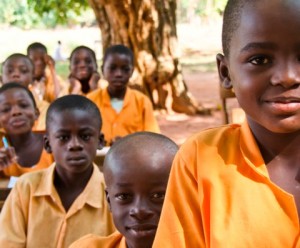Globally 40% don’t access education in languages they understand – UNESCO
 …In Ghana 12% underprivileged children never been to school
…In Ghana 12% underprivileged children never been to school
A new policy paper by UNESCO issued February 19, 2016 says 40 per cent of people in the world can’t access education in a language that they can understand.
According to the paper being taught in a language other than their own can negatively impact children’s learning, especially for those living in poverty.
“With a new global education agenda that prioritizes quality, equity and lifelong learning for all, it is essential to encourage full respect for the use of mother language in teaching and learning, and to promote linguistic diversity. Inclusive language education policies will not only lead to higher learning achievement, but contribute to tolerance, social cohesion, and, ultimately, peace,” Irina Bokova, UNESCO Director-General was quoted as saying.
Within the context of the SDG4 which is to ensure inclusive and equitable quality education and promote lifelong learning opportunities for all, the paper argues that teaching children in a language that they understand could make education inclusive.
Citing Guatemala, the paper noted that learning improves in countries that have invested in bilingual programmes.
“In Guatemala, students in bilingual schools have lower repetition and dropout rates. They also have higher scores in all subject areas. Children in Ethiopia who participated in bilingual programmes for eight years improved their learning in subjects across the curriculum,” it says.
The paper cited examples in countries like Côte d’Ivoire, Iran and Honduras.
In Côte d’Ivoire, it says 55 per cent of grade 5 students who speak the test language at home learned the basics in reading in 2008, compared with 25 per cent of those who speak another language.
It states that in Iran, 80 per cent of grade 4 students who did not speak Farsi at home reached the basics in reading, compared with over 95 per cent of Farsi speakers and in Honduras, in 2011, 94 per cent of grade 6 students who spoke the language of instruction at home learned the basics in reading compared to 62 per cent of those who did not.
According to UNESCO’s World Inequality Database on Education, which highlights the powerful influence of circumstances, such as wealth, gender, ethnicity and location, over which people have little control but which play an important role in shaping their opportunities for education and life 12 per cent of underprivileged children have never been to school.
Factors such as urban, rural environments were also seen to have affected the ability to access education.
While only 6 per cent of children in urban areas are unable to access primary education, it is 16 per cent in the rural areas, and while only 3 per cent of children of primary school going age in the Greater Accra Region arte unable to access education it is 31 per cent in the Northern Region.
By Emmanuel K. Dogbevi
